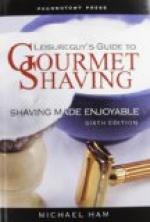It was settled on that basis.
“Can’t you take me to the aviation place sometime, Uncle Jed?” asked Barbara.
Jed thought he could, if he could borrow a boat somewhere and Mrs. Armstrong was willing that Barbara should go with him. Both permission and the boat were obtained, the former with little difficulty, after Mrs. Armstrong had made inquiries concerning Mr. Winslow’s skill in handling a boat, the latter with more. At last Captain Perez Ryder, being diplomatically approached, told Jed he might use his eighteen foot power dory for a day, the only cost being that entailed by purchase of the necessary oil and gasoline.
It was a beautiful morning when they started on their six mile sail, or “chug,” as Jed called it. Mrs. Armstrong had put up a lunch for them, and Jed had a bucket of clams, a kettle, a pail of milk, some crackers, onions and salt pork, the ingredients of a possible chowder.
“Little mite late for ’longshore chowder picnics, ma’am,” he said, “but it’s a westerly wind and I cal’late ’twill be pretty balmy in the lee of the pines. Soon’s it gets any ways chilly we’ll be startin’ home. Wish you were goin’ along, too.”
Mrs. Armstrong smiled and said she wished it had been possible for her to go, but it was not. She looked pale that morning, so it seemed to Jed, and when she smiled it was with an obvious effort.
“You’re not going without locking your kitchen door, are you, Mr. Jed?” she asked.
Jed looked at her and at the door.
“Why,” he observed, “I ain’t locked that door, have I! I locked the front one, the one to the shop, though. Did you see the sign I tacked on the outside of it?”
“No, I didn’t.”
“I didn’t know but you might have. I put on it: ’Closed for the day. Inquire at Abijah Thompson’s.’ You see,” he added, his eye twinkling ever so little, “’Bije Thompson lives in the last house in the village, two mile or more over to the west’ard.”
“He does! Then why in the world did you tell people to inquire there?”
“Oh, if I didn’t they’d be botherin’ you, probably, and I didn’t want ’em doin’ that. If they want me enough to travel way over to ’Bije’s they’ll come back here to-morrow, I shouldn’t wonder. I guess likely they’d have to; ’Bije don’t know anything about me.”
He rubbed his chin and then added:
“Maybe ’twould be a good notion to lock that kitchen door.”
They were standing at the edge of the bluff. He sauntered over to the kitchen, closed the door, and then, opening the window beside it, reached in through that window and turned the key in the lock of the door. Leaving the key in that lock and the window still open, he came sauntering back again.
“There,” he drawled, “I guess everything’s safe enough now.”
Mrs. Armstrong regarded him in amused wonder. “Do you usually lock your door on the inside in that way?” she asked.




